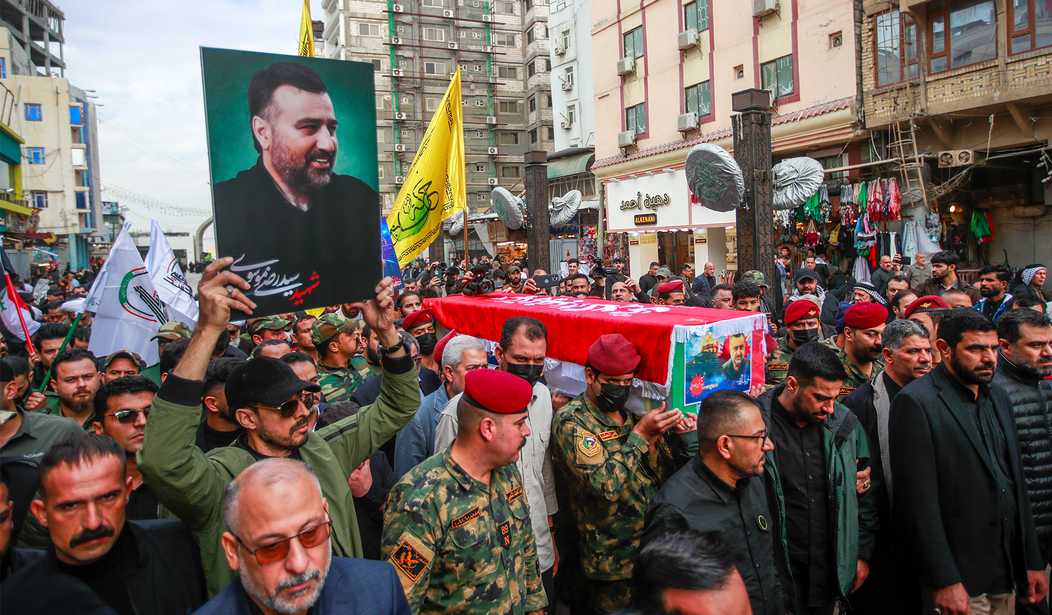The United States has 900 troops in Syria and another 2,500 in Iraq. They are there ostensibly to deter ISIS and show the U.S. flag in a volatile part of the world.
Instead, they've become sitting ducks.
At present, there is no ISIS worth mentioning to "deter," and "showing the flag" in two failed states is hardly in the interests of the United States. The Pentagon points out that terrorists are crossing the Iraq-Syrian border at will but so far, we haven't done much to stop them.
Because of the inability to find a clear-cut mission for these troops, there's already talk within the administration to withdraw from both countries.
There's been a massive uptick in attacks on U.S. troops since the October 7 Israel-Hamas war broke out. "Since the Israeli assault began, U.S. military installations in Iraq have been attacked more than 60 times and those in Syria more than 90 times," writes Paul Pillar in Responsible Statecraft.
Pillar writes that the "now-familiar tit-for-tat sequence in which American airstrikes against militias in Iraq or Syria alternate with more militia attacks on the U.S. installations illustrates a perverse form of mission creep." Indeed, the harder we strike back, the more the enemy escalates, and in the end, we draw closer to creating the conditions for a regional war.
"Whatever was the original mission of the U.S. troop presence gets sidelined as protection of the troop presence itself becomes the main concern," Pillar writes. "The tit-for-tats also carry the risk of escalation into a larger conflict.'
On Iraq, Austin confirmed the start of the long-expected U.S.-Iraq Higher Military Commission, which the two nations agreed to back in August. Officials will discuss how the U.S.-led coalition to defeat ISIS will “transition” based on three factors: the terrorist threat, “operational and environmental requirements,” and the abilities of the Iraqi security forces, according to the Pentagon.
The Pentagon claims that U.S. troops have a stabilizing effect on Iraq and Syria. For that reason, Biden and the administration have taken great pains not to mention the word "withdrawal" when talking about the future of U.S. troops in those countries.
As for Syria, three senior administration officials confirmed there are deliberations about withdrawal, though they couched them as part of routine planning discussions about where troops are most useful, how much longer the mission should go on and when, if ever, American forces should leave the country.
Withdrawing those 3400 troops from Iraq and Syria safely should obviously be the number one goal. That may be more difficult than it appears to be on the surface. Any number of terrorist militias would dearly love to deliver a blow to the U.S. while it is in the act of retreating. Two suicide bombers at Kabul airport in the final days of the Afghanistan withdrawal made that very clear when they took out 60 Afghan security forces and 13 Americans.
The most recent attack hit a U.S. installation known as "Tower 22" in Jordan near where the Iraq/Syrian/Jordanian borders meet. The U.S. military base at al-Tanf in Syria is just 12 miles north of Tower 22. If the U.S. goes to war against Iran, it's likely to start there.
"The Jordanian installation provides a critical logistical hub for U.S. forces in Syria, writes AP. Further, Jordan issued a statement condemning the drone strike.
“Jordan will continue to counter terrorism and the smuggling of drugs and weapons across the Syrian border into Jordan, and will confront with firmness and determination anyone who attempts to attack the security of the kingdom,” the statement attributed to Muhannad Mubaidin, a government spokesman, said.
Exclusively for our VIPs: Why Is Iran Trying to Goad the U.S. Into a War It Cannot Win?
Jordan is a key ally in the region, and few would suggest the U.S. withdraw many of the 3,000 troops stationed around the Hashemite Kingdom. King Abdullah has been a loyal ally even when it's been difficult for him domestically.
But Iraq and Syria are a different matter. Both failed states are not worth fighting a war with Iran over and even many in the Biden administration agree with that.










